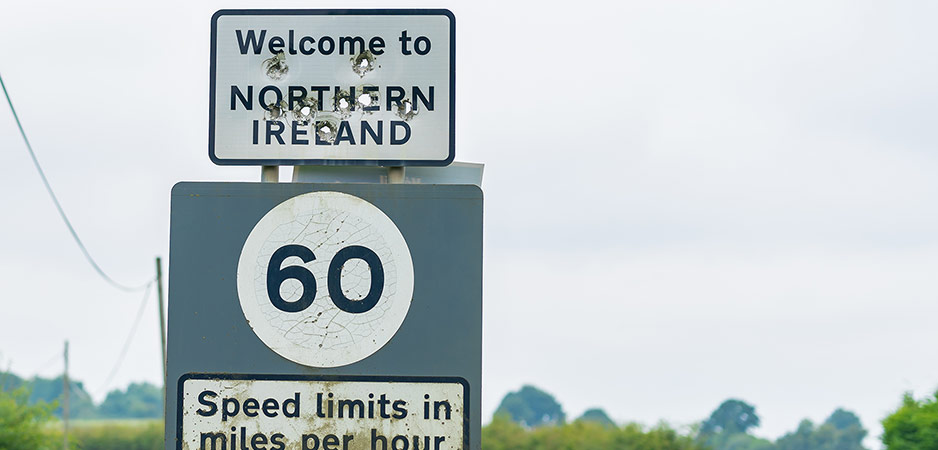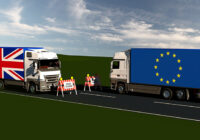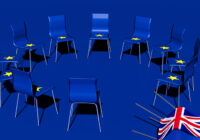The Republic of Ireland has been an enthusiastic member of the European Union since 1973, having both gained and given so much from being part of the EU. In the toxic mayhem of Brexit Britain, one question is perhaps more confounding than most, namely how did the Irish backstop issue emerge as a surprising problem? How could Ireland, with a population of just 4.8 million, have the power to impede the mighty British plan to cut the cord to the EU — a union that the Brexiters have reimagined as a cruel oppressive colonizer?
British rule has cast a long shadow over Ireland. Now 27 EU countries, large and small, are defending the Irish Republic’s right to maintain a frictionless and open border with Northern Ireland, as mandated by the historic Good Friday Agreement. Why did no one seem to see the issue of the Irish border spoiling all the little Englander plans for their new small-island world? How did it come to be a surprise, with 800 years of painful history to muse on?
Sea of Blood
The problem is that in looking back to a supposedly glorious past in “taking back control,” the British are looking back at a legacy that was built on a sea of blood and injustice. It is a history of cruelty, exploitation and neglect. During the 16th and 17th centuries, the wholesale colonialization of Ireland accelerated as land was stolen from the Irish people, who were punished for using their own language, forbidden to own land and denied any political rights. Catholics experienced discrimination in every aspect of their lives. A system of vassalage reduced the rural poor to tiny plots of barren land, obliged to pay extortionate rents to local and absentee landlords in England.
To this day, the population of Ireland has not recovered from the human destruction of the great famine of 1845-49 when the potato harvest failed. Potatoes constituted the main diet of the impoverished rural communities, and while butter, cheese and wheat continued to be exported, and a wide range of food was available, the rural poor were left to die in terrible circumstances. The landlords showed no mercy for the starving population, the famine largely ignored by the British ruling class. A million died and a million emigrated, with the population falling by 25% within a decade. The pain and horror of this disaster for the people of Ireland was a powerful driver for their determination to fight for independence and still resonates today.
Over many years after the famine, successive waves of resistance and struggle for independence continued, culminating in the 1916 Easter Rising, during which a republic was proclaimed by the leaders of the rebellion against colonial rule. In the British reprisals that followed, the rebel leaders were court-martialed and executed, and hundreds were killed. The severity of the backlash heightened the Irish people’s determination to free themselves and increased support for the republican Sinn Féin party, which won decisively in the general election of 1918, gaining 73 out of a 105 seats reserved for Ireland in for the House of Commons. Sinn Fein were not prepared to take their seats in Westminster — and refuse to this day — and set up an alternative government in Ireland, the first Dail Eireann.
The British government, however, refused to honor the results of the election, and the unionists in the north of Ireland threatened violence. The War of Independence started in 1919, lasting until 1921, when a truce was called. The result was the partitioning of Ireland and the creation of the Irish Free State, which had control of 26 of the island’s 32 counties. In 1948 it was renamed the Republic of Ireland, though this was contended by those who believed the republic should include the whole of Ireland. The six counties of the north became Northern Ireland. A border with no historical or geographical relevance was created to maintain a unionist majority in the six counties of the wealthier industrialized north, which then continued to be ruled by Britain as Northern Ireland and as part of the United Kingdom.
The unionists then maintained power through the next eight decades by gerrymandering, discrimination in housing, in the workplace and at the ballot box. The most basic principles of democracy and enfranchisement were absent. This was subsequently challenged by the civil rights protests of the late 1960s. The violent response to these peaceful protests, including the murder of innocent civilians in the Bloody Sunday massacre in Derry, Northern Ireland, in 1972, escalated into a decades-long armed conflict between the British government and the Irish Republican Army, the IRA. The Good Friday Agreement was signed in 1998 with immense effort across the whole of Ireland and the United Kingdom, with international mediation. It is founded on key principles including an open border with the republic — which is now threatened by Brexit.
Arbitrary Borders
The policy of imposing arbitrary borders, created to solve the problems caused by colonial rule, was a model the British followed with disastrous results, leaving a legacy of pain and conflict to this day — in places like India, Pakistan, Palestine and Nigeria. Nearly a quarter of the world was once under the extractive and rapacious rule of the British Empire, at its height before the Second World War. The gentle pink of the maps did not show what was stolen, how many died — how culture, history and heritage were denied.
Ireland’s place in the world, its success as an exporter of its rich culture — music, art, literature, technology and expertise — have all been given the opportunity to flower within the EU’s diverse trading block, built on the free movement of people and goods. Dublin has become an international, vibrant and dynamic city, with a lively and youthful culture that challenges the reactionary forces that have dominated Irish politics for so long. A modern, truly European and sophisticated country has emerged from the crushing impact of its past oppression. It has thrown off the shackles of the Catholic Church in recent years, voting for gay marriage and to end the country’s cruel anti-abortion law — the 8th Amendment that prevented all recourse to safe termination even if the price was the death of the mother.
These issues continue to divide neighboring Northern Ireland, with the Democratic Unionist Party (DUP), which currently gives the Conservative government its parliamentary majority in Westminster, still clinging to fundamentalist attitudes toward women and the LGBTQ community. Northern Ireland voted overwhelmingly to remain in the European Union, but the DUP is committed to leaving the EU and remaining in the bitter past. It has been embroiled in corruption scandals like the “cash for ash” debacle that led to the collapse of the power-sharing agreement in Stormont, leaving Northern Ireland without a functioning government for over two years and counting.
Earlier this month, in the absence of a governing body, MPs in Westminster voted to extend rights to abortion and gay marriage to Northern Ireland.
The billions that were promised by Teresa May’s Conservatives to DUP leader Arlene Foster was a hopeless attempt at vote-buying in order to secure a working majority in the UK Parliament. The DUP’s attachment to its failing powers becomes narrow and blinkered in the context of the electoral successes of Sinn Féin across the whole of Ireland and the increasingly progressive changes that have transformed life in the republic.
Taking, Not Giving
The British have a long history of wanting to continue to take from their erstwhile colonies but not being prepared to give back. They benefited, after the destruction of the Second World War, from the Caribbean immigrants who were encouraged to come here to provide desperately needed skills, only to cruelly reject these children of the Windrush generation who drove our buses, nursed our patients and helped rebuild our country. Despite the scandal, the National Health Service is once again recruiting Jamaican nurses to make for the shortfall in staff following the EU referendum vote.
Yes, curry may be Britain’s most popular national dish, but discrimination and the toxic impact of the UK Home Office’s policies have created a “hostile environment” fostered in the six years of Theresa May as secretary of state have continued under Amber Rudd and now Sajid Javid. We have seen so many cases of injustice and abuse, most recently with the withholding of visas to academics from Africa visiting the UK for vital work on issues such as the Ebola epidemic.
The initial stages of the attempt by the Home Office to manage the question of EU residents’ status post Brexit have been marked by incompetence, confusion and uncertainty, bearing the hallmarks of another episode of discrimination and hostility. The building of new barriers, a cornerstone of Brexit, will impoverish the United Kingdom and sow disunity and disorder, unpicking the fabric of our society built on a free movement for all — both for those who have brought their skills and talents from other countries in Europe and for British citizens who have chosen to retire in sunnier places or work in other countries on the continent.
Those of Irish heritage in the UK have flooded their embassy with requests for an Irish passport, allowing holders to continue to travel and work across Europe as free citizens. The rest of us will be in the slow queue, going backward.
The burden of history is weighing heavily on Britain as it battles with its fantasies of taking back control and the bizarre idea that a trading bloc is actually a cruel colonizing power. So many myths have taken hold, with Brexiters embracing victimhood. The real politics and history of the border between the republic and Northern Ireland, created by the colonial past, have somehow been forgotten along with the fragility of a hard-earned peace.
The idea that an Ireland it once totally controlled and exploited having any power over the mighty British bulldog seems an unreasonable reversal of fortunes, feeding the fantasy that Britain can return to its “glorious past” when it ruled the world, building its wealth and strength on the misery of others in countries both nearby and far away.
The views expressed in this article are the author’s own and do not necessarily reflect Fair Observer’s editorial policy.
Support Fair Observer
We rely on your support for our independence, diversity and quality.
For more than 10 years, Fair Observer has been free, fair and independent. No billionaire owns us, no advertisers control us. We are a reader-supported nonprofit. Unlike many other publications, we keep our content free for readers regardless of where they live or whether they can afford to pay. We have no paywalls and no ads.
In the post-truth era of fake news, echo chambers and filter bubbles, we publish a plurality of perspectives from around the world. Anyone can publish with us, but everyone goes through a rigorous editorial process. So, you get fact-checked, well-reasoned content instead of noise.
We publish 2,500+ voices from 90+ countries. We also conduct education and training programs
on subjects ranging from digital media and journalism to writing and critical thinking. This
doesn’t come cheap. Servers, editors, trainers and web developers cost
money.
Please consider supporting us on a regular basis as a recurring donor or a
sustaining member.
Will you support FO’s journalism?
We rely on your support for our independence, diversity and quality.






